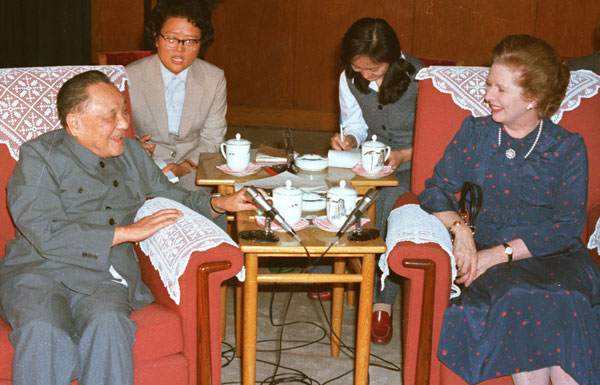Thatcher 'helped push ties with China'
Updated: 2013-04-09 01:58
By Qin Zhongwei and Pu Zhendong in Beijing, Zhang Chunyan in London and Andrea Deng in Hong Kong (China Daily)
|
|||||||||
Margaret Thatcher, the Iron Lady of British politics who died on Monday at 87, played a key role in China's relationship with the United Kingdom, especially in the peaceful handover of Hong Kong, experts said.
Britain's first and only female prime minister, Thatcher died peacefully at the age of 87 after suffering a stroke, her family announced. She governed Britain from 1979 to 1990.
 |
|
Chinese leader Deng Xiaoping met with then-British prime minister Margaret Thatcher in Beijing on Sept 24, 1982. Photo by Xinhua |
"Margaret Thatcher played an important role in the development of UK-China relations. During the discussions over the handover of Hong Kong in the early 1980s, she came to recognize that it was important that the transition from British to Chinese rule should be smooth, and the diplomatic process was positive and productive as a result," said Rana Mitter, professor of Modern China at Oxford University.
"Although she was always determined to stand up for what she regarded as British national interests, she also understood the importance of pragmatism, and of good relations with China," Mitter said.
Tian Dewen, an expert on European studies at the Chinese Academy of Social Sciences, said Thatcher realized the importance of a rising China.
"Her visit to China and her decision to promote bilateral ties on economy and trade demonstrated to the Western world the necessity to communicate with China during the Cold War period, and Sino-UK relations have been on good terms since then," Tian said.
"She called for dialogue instead of confrontation with China in resolving the Hong Kong question, showing her vision as an outstanding politician," he said.
She was active in engaging with China and including it in the world system, which helped create a favorable international environment at a key period of China's reforms, he said.
Feng Zhongping, an expert on European issues at the China Institutes of Contemporary International Relations, said Thatcher was a realist in terms of Sino-British ties.
"Thatcher was very willing to develop relations with China," Feng said. "She had some concerns on settling the Hong Kong question at first, but after she visited China and talked to Deng Xiaoping, she changed her mind to facilitate a historic joint declaration between the two governments," Feng said.
Thatcher visited China four times, the first in 1977 as leader of the opposition.
During her subsequent visit in 1982, the first to China by a serving British prime minister, she met Chinese leader Deng Xiaoping and discussed the future of Hong Kong.
Cheung Chi-kong, executive director of the One Country Two Systems Research Institute in Hong Kong, said Margaret Thatcher might have made a wrong judgment from day one — when she decided to negotiate with Beijing.
She had underestimated China's persistence in sovereignty and national dignity, Cheung said.
Beijing was determined to resume sovereignty over Hong Kong, Cheung said.
After two years of negotiations, China and Britain released the Sino-British Joint Declaration in 1984, paving the way for Hong Kong's handover in 1997.
- Fond farewells for 'Iron Lady'
- US secretary of state mourns Thatcher's death
- Thatcher to be remembered as'towering figure': UN chief
- Thatcher lays foundation of Sino-British ties
- World lost giant leader with Thatcher's death: Harper
- Britain's 'Iron Lady' Margaret Thatcher dies
- Ceremonial funeral for Britain's Thatcher
- Archive pictures of Margaret Thatcher

 Li Na on Time cover, makes influential 100 list
Li Na on Time cover, makes influential 100 list
 FBI releases photos of 2 Boston bombings suspects
FBI releases photos of 2 Boston bombings suspects
 World's wackiest hairstyles
World's wackiest hairstyles
 Sandstorms strike Northwest China
Sandstorms strike Northwest China
 Never-seen photos of Madonna on display
Never-seen photos of Madonna on display
 H7N9 outbreak linked to waterfowl migration
H7N9 outbreak linked to waterfowl migration
 Dozens feared dead in Texas plant blast
Dozens feared dead in Texas plant blast
 Venezuelan court rules out manual votes counting
Venezuelan court rules out manual votes counting
Most Viewed
Editor's Picks

|

|

|

|

|

|
Today's Top News
Boston bombing suspect reported cornered on boat
7.0-magnitude quake hits Sichuan
Cross-talk artist helps to spread the word
'Green' awareness levels drop in Beijing
Palace Museum spruces up
First couple on Time's list of most influential
H7N9 flu transmission studied
Trading channels 'need to broaden'
US Weekly

|

|








